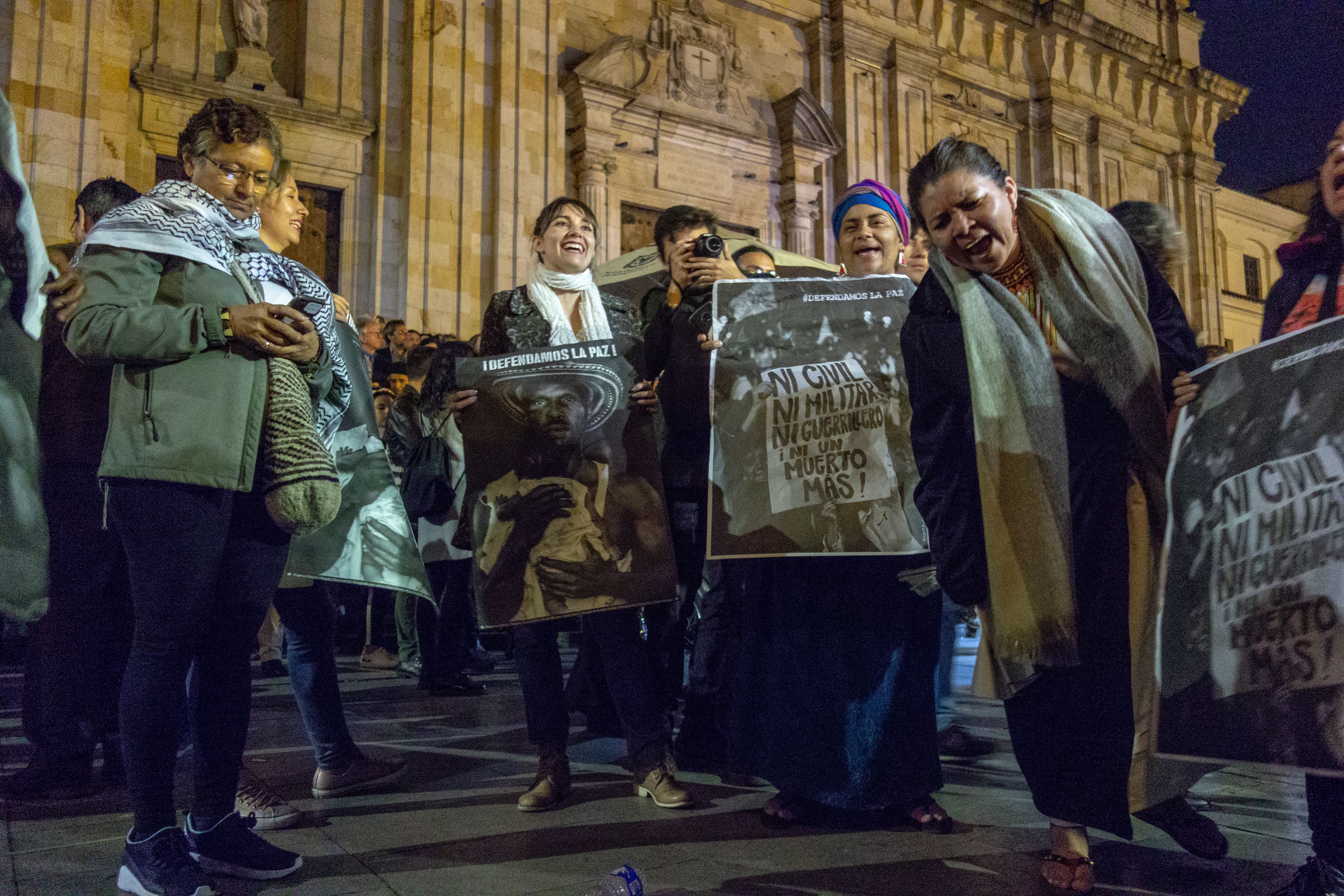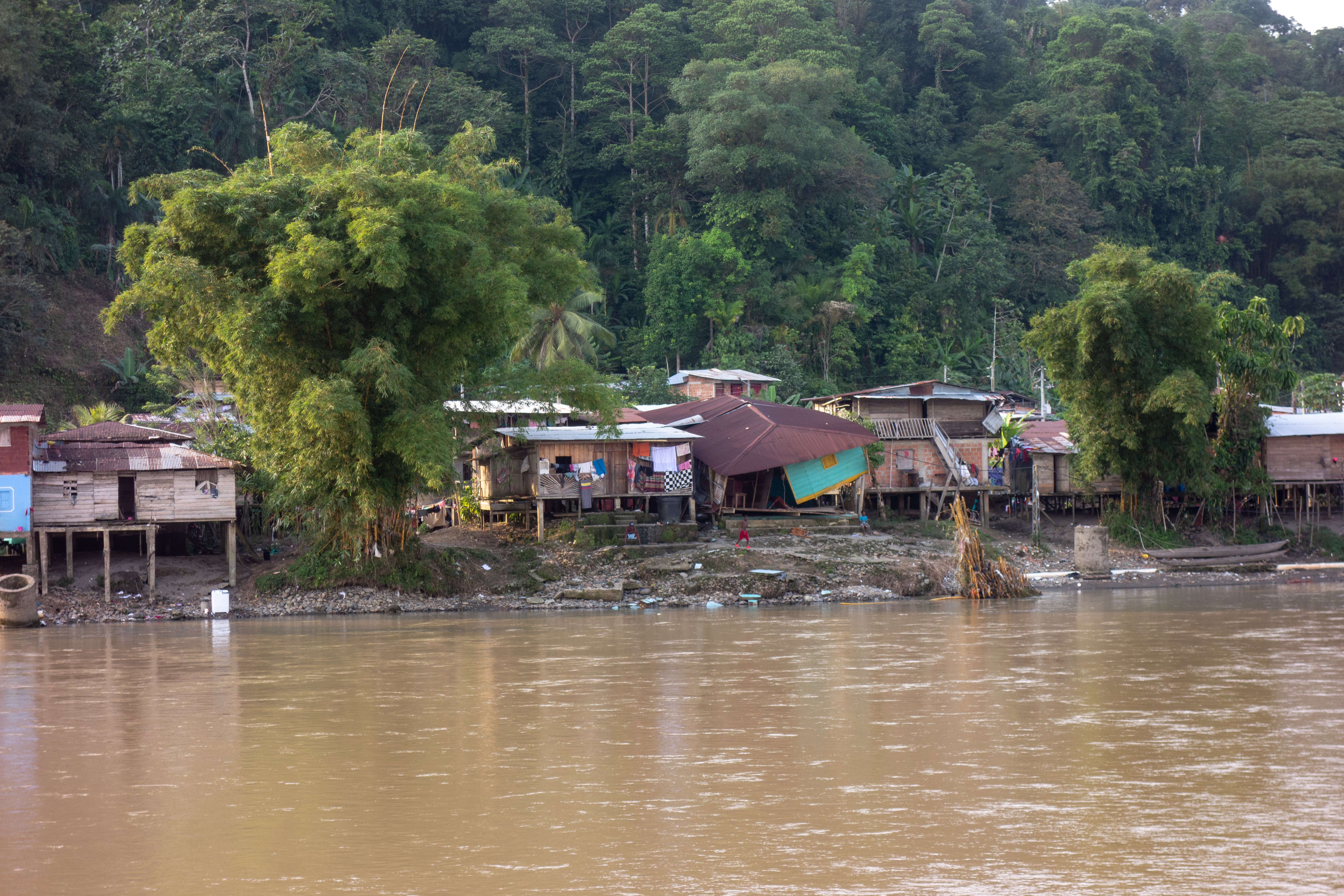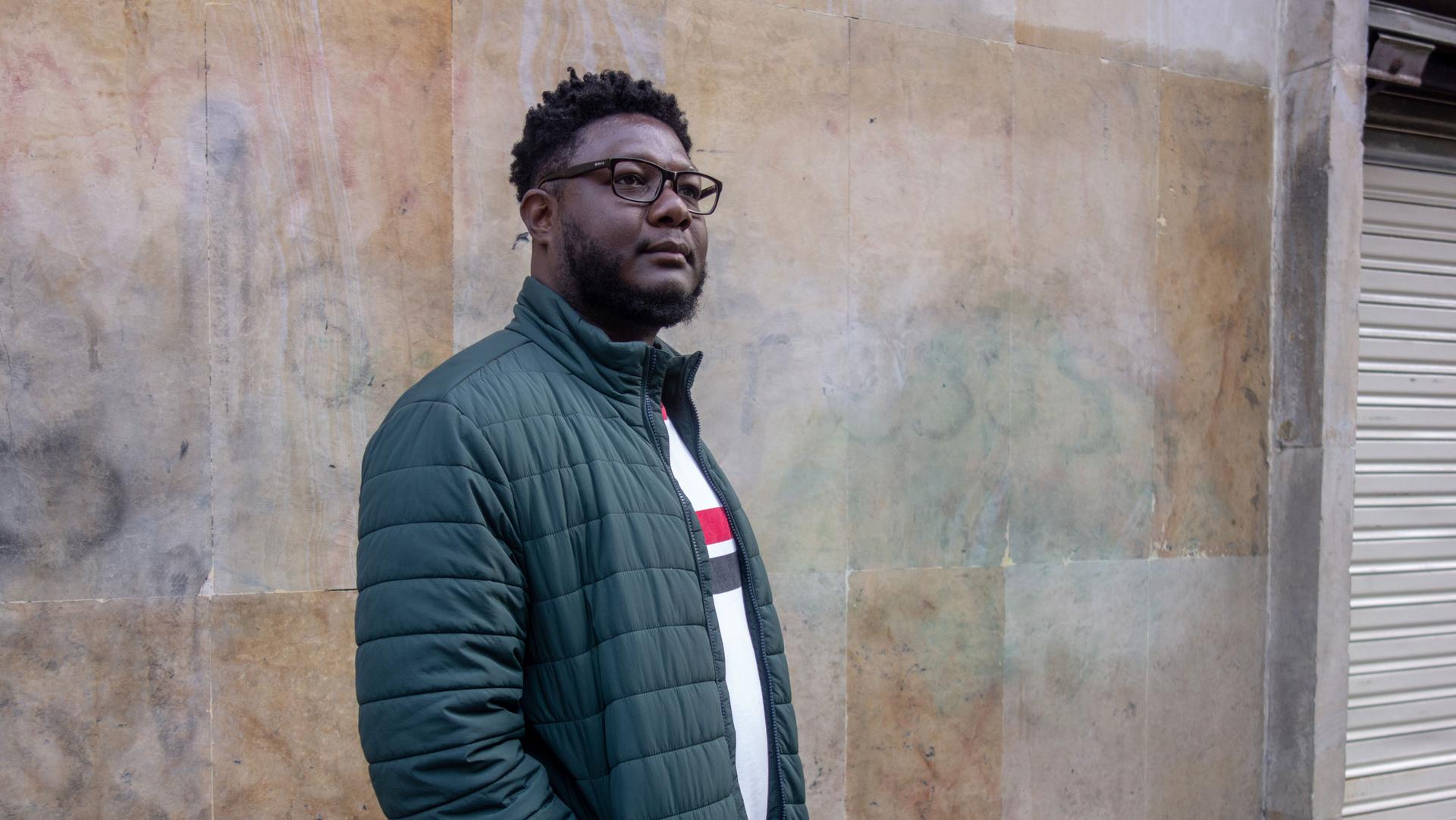Social activists risk their lives as Colombia’s peace process falters
César Augusto has received several written threats in the form of emails and pamphlets from paramilitary groups for being a social activist for Afro Colombians. In December 2018, his home was broken into in what he says was a clear message: “Stop what you are doing or we’ll kill you.” Augusto poses for a photo in Bogotá, Colombia, on March 18, 2019.
Last December, César Augusto arrived in his home city of Cali, in southwest Colombia, with a sense of triumph.
As an education advocate, he was optimistic after attending a round of negotiations in the capital of Bogotá that broke a deadlock with the Colombian government over the future of thousands of Afro Colombians who lack access to higher education.
But when Augusto arrived home, he found the lock on his door had been smashed in and the contents of his room were strewn in a mess on the floor.
“If someone had wanted to take something they would have,” he says. “The message was clear: ‘We know who you are and we know where you live. Stop what you are doing or we’ll kill you.’”
A tall, bulky figure exuding confidence, Augusto is not usually easily intimidated. But this time, actions meant more than words.
“I couldn’t sleep for weeks. I was in constant fear and anxiety, ending up in an existential crisis asking how I ended up in this situation.”
“I couldn’t sleep for weeks. I was in constant fear and anxiety, ending up in an existential crisis asking how I ended up in this situation,” Augusto said.
In 2016, a peace accord between Colombia’s largest communist insurgency, the Revolutionary Armed Forces of Colombia, or FARC, and the Colombian government promised a new era of peace after 50 years of conflict.
But in the last two years, 462 activists and human rights defenders have been murdered, according to Colombia’s human rights ombudsman, Carlos Alfonso Negret. At present, a social leader is killed every three days — and most culprits go unpunished.
In 2012, Augusto received several intimidating anonymous emails in which his name appeared on a list — he says others on that list have been killed. The next year, he started receiving ominous pamphlets from The Black Eagles, which he feels are death threats. The Black Eagles is a label used by paramilitary groups across the country to protect their identity and strike fear. The groups have been targeting activists like Augusto for disrupting the status quo.
Colombian President Iván Duque, who took office in August 2018, has denounced the killings and created a national commission dedicated to investigating and halting them.
But critics are skeptical: They say the murders will never stop as long as Duque’s government is working against the peace process.
The Duque administration has been a vocal critic of the peace agreement. It sparked mass protests when it announced on March 10 that legislation on the Jurisdicción Especial para la Paz — or JEP, the tribunal founded to reconcile war crimes through prosecution — would be sent back to Congress for amendments. The government says the tribunal is too soft on ex-guerrillas.
On Monday, April 8, however, his proposals were voted down in the lower house.

Related: In post-conflict Colombia, imprisoned ex-combatants help maintain a fragile peace
For nearly a month, Indigenous groups in Cauca, also in the southwest, blocked highways and clashed with police in protests against the government’s failure to protect social leaders and its efforts to revise the peace accord. At least eight Indigenous protesters and a policeman were killed in the melees before a signed agreement was reached on April 12.
But Augusto is doubtful that recent activism in Cauca — or elsewhere in Colombia — will amount to real change.
After moving house several times, he hid from friends and family out of fear that his loved ones could be targeted. He has not received any further threats in three months, but remains anxious that he could one day join the growing number of activists, locally known as social leaders, who find themselves in the crosshairs of brutal paramilitaries and drug-trafficking groups.
“In developed countries, killing — whether three people, 10 people or just one — is a crime that is condemned. Here it is just another number: There is no national commotion, no outcry, you could be killed at any moment.”
“In developed countries, killing — whether three people, 10 people or just one — is a crime that is condemned. Here it is just another number: There is no national commotion, no outcry, you could be killed at any moment,” Augusto says.
Faltering peace process, stolen lands
After 50 years of conflict, the 2016 historic peace deal (which won its architect, ex-President Juan Manuel Santos, a Nobel Peace Prize) was touted as the end to the systematic violence and brutality that plagued Colombia.
The country was lauded as an international success story as the FARC — the oldest guerrilla army in the Western hemisphere — put down its guns and the country turned a new chapter.
But nearly three years on, the process is faltering as armed gangs and drug cartels continue to grip the country.
Homicide rates are creeping up and activists — mostly campesinos, or country people, along with Afro Colombians and Indigenous groups — have all faced systemic killings. Colombia’s human rights ombudsman, Carlos Alfonso Negret, has labeled it an “extermination.”
Some have been shot by masked hitmen on motorbikes, while others are dismembered and left as a gruesome message to local communities.
Related: Former FARC fighters turn a camp into a tourist attraction
The motives vary, but many of the murders are committed by paramilitaries that sprung up in the 1960s as a cutthroat response to guerrilla armies who threatened land interests. Others are killed by drug-trafficking groups and criminal gangs, according to a 2019 study by the Colombian Commission of Lawyers. Perpetrators in nearly half of cases go unidentified.
As land disputes continue, paramilitary forces continue terrorizing rural communities while profiting from drug trafficking and illegal mining.
“The key causes of the killings of social leaders are mining and water, the substitution of crops, and land restitution. … The key link between all of them is land, which has been a forgotten agenda for 60 years and is only getting worse.”
“The key causes of the killings of social leaders are mining and water, the substitution of crops, and land restitution,” says Gerardo Vega Medina, director of Forjando Futuros, a foundation that advocates the return of land stolen during the conflict. “The key link between all of them is land, which has been a forgotten agenda for 60 years and is only getting worse.”
In 2011, the government pledged to return land to 300,000 campesino families; this pledge was reinforced in the peace accord. However, only 8,100 families (2.7%) have had land returned, says the foundation, and only about 710,000 of the 15 million acres of land stolen have been returned to their rightful owners.
A large number of activists who were killed had been campaigning to return land they say was seized or bought by big businesses that used duplicitous scare tactics to get rock-bottom prices.
The current government, however, is a vocal critic of the peace accord.
It is now revising legislation to put the onus on victims to prove they were forced to sell their land at dirt-cheap prices, rather than big businesses to prove they acquired it cleanly.
“They are legalizing 30 years of plundering land by those who took advantage of violence to make themselves rich,” Medina says.
In 2006, it was revealed that several of Duque’s Democratic Center Party congressmen — including the cousin of then-president Álvaro Uribe, who is Duque’s mentor — had links with the AUC, or United Self-Defense Forces of Colombia, paramilitary group.
Some of Democratic Center’s critics allege those loyalties never went away.
“They don’t want us to know the truth. They are trying to hide the crimes committed during the conflict because they used it as a pretext to get rich.”
“They don’t want us to know the truth. They are trying to hide the crimes committed during the conflict because they used it as a pretext to get rich,” said María Eugenia Cruz, coordinator of the National Network of Women Defenders of Human Rights at a March protest in defense of the JEP in Bogotá.
‘Forgotten state’
In Chocó state, an oppressively humid coastal region on the Pacific Ocean, people are particularly vulnerable to the whims of ruthless armed gangs. The state is 82% Afro Colombian; Indigenous groups are the second-largest majority.
Even with rich gold deposits, Chocó still remains the most underdeveloped region in the country, with nearly 60% of people living in poverty.
“There was a moment of peace when the FARC demobilized. … But as this region is so attractive for armed gangs and multinational businesses, the territory has already been filled with new groups. We are worse off than we were three years ago.”
“There was a moment of peace when the FARC demobilized,” says Helfer Andrade, coordinator of the board of Indigenous people in Chocó. “But as this region is so attractive for armed gangs and multinational businesses, the territory has already been filled with new groups. We are worse off than we were three years ago.”
Istmina, a remote town consisting of two rows of precarious wooden houses lining a murky green river, illustrates why the people of Chocó often describe their state as “forgotten.”
Istmina city councilor Yustin David Mosquera was explaining how floods devastated the town last month when he was cut short by alarming news — just 15 minutes away, the body of a politician campaigning in local elections was found floating in a river. Marked with signs of torture, the community suspects he is the latest victim of armed gangs operating in the area.

“The residents of the town are dismayed. … We pray the authorities can do their job and find the culprit,” Mosquera says. The city councilor decided to suspend all political campaigning out of fear.
A month later, police say there is still no suspect.
Security analysts say as many as 91.4% of cases go unpunished, fueled by rampant corruption in the police and judicial system that has allowed the murders of social leaders to spiral out of control.
“Colombia has, perhaps, on paper the best ideas in the world for protecting social leaders. The problem is it doesn’t work.”
“Colombia has, perhaps, on paper the best ideas in the world for protecting social leaders. The problem is it doesn’t work,” says Gimena Sánchez, director for the Andes at the Washington Office on Latin America.
The National Protection Unit, a government entity, is charged with providing security guards and armored cars to those who defend human rights, the peace process, natural resources, land or the environment when their lives are in danger. But too often those requests are denied.
“There is a tremendous pushback on giving protection measures to people who need them and it reflects prejudices and biases, but also protects economics and landed interests in these areas,” says Sánchez, who believes many activists are ignored due to their race.
Related: Despite accord, peace in Colombia is tenuous as country heads to runoff election
Augusto frequently visits Chocó to check on the progress of Afro Colombian students who receive government scholarships — but not with the protection or support he needs.
Twice he has requested protection from the state to no avail. Even if he were granted protection, he says he fears he could be betrayed by security guards who, in some cases, have worked as informants.
Over 180 organizations, social groups, and Indigenous and Afro Colombians organized a national strike on April 25 and as part of the strike they’ll be camping out in Bogotá from April 28 through March 2 to protest the systematic violence and call for peace.
“I will never feel safe in this country. … Those in power will not allow a different state of affairs. They have only ever known how to operate while capitalizing on the fear of war.”
“I will never feel safe in this country,” Augusto says. “Those in power will not allow a different state of affairs. They have only ever known how to operate while capitalizing on the fear of war.”
